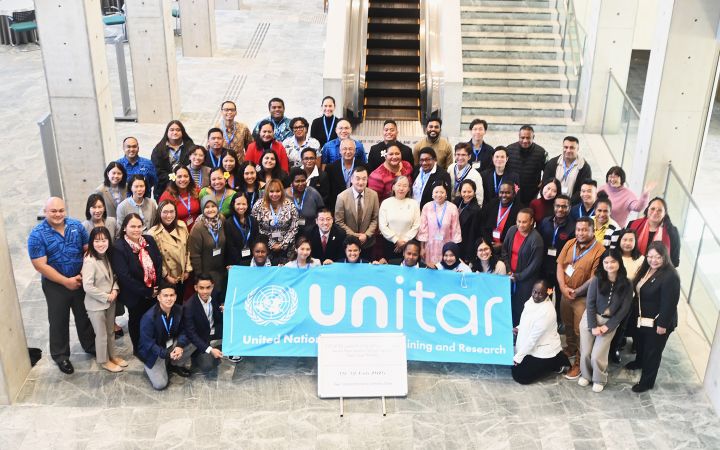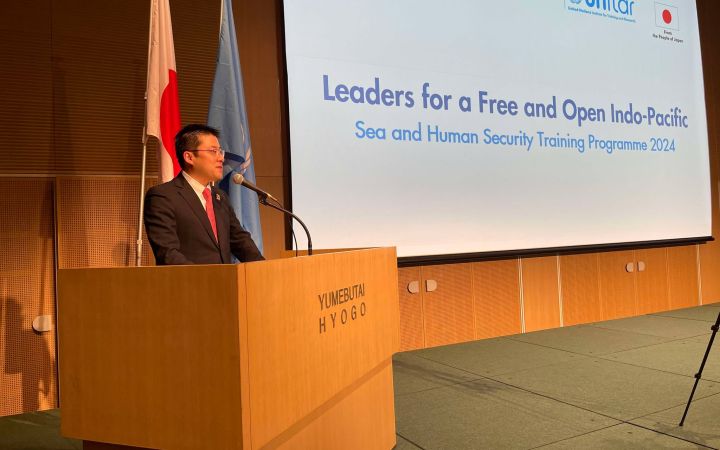- Fifty participants from 18 Asia-Pacific countries have embarked on a 12-day workshop in Japan from Awaji Island (Awaji-shima), to Hiroshima, Chiba and Tokyo, as the final phase of the " Leaders for a Free and Open Indo-Pacific: Sea and Human Security Training Programme ", funded by the Government and People of Japan.
- The workshop officially launched in Awaji Island, Hyogo, with representatives from Pasona Group Inc., a key partner in organizing the training sessions in Awaji Island, also in attendance.
- Through expert lectures and study visits, participants will gain practical knowledge in marine resource management, sustainable fisheries and agriculture, sea environment protection, community empowerment, disaster risk management and policy development.
- On 21 February 2025, UNITAR will host a public event in Tokyo, which will also be livestreamed. At the public event, selected teams of participants will present policy recommendations and practical solutions to sea and human security challenges.
10 February 2025, Hyogo, Japan - Fifty leaders from 18 countries across Asia and the Pacific have gathered in Awaji Island, Japan, today to join a workshop on sea and human security, organized by the United Nations Institute for Training and Research (UNITAR).
Running from 10 to 21 February 2025, the 12 day-long workshop in Japan is part of the final phase of the " Leaders for a Free and Open Indo-Pacific: Sea and Human Security Training Programme ". The programme, financially supported by the Government and People of Japan, aims to address sea and human security challenges in the Indo-Pacific region.
Through specialized lectures, study visits and collaborative exercises, participants will gain practical knowledge in marine resource management, sustainable fisheries and agriculture, sea environment protection, community empowerment, disaster risk management and policy development. They will develop actionable policy briefs aimed at enhancing regional resilience and strengthening local capacity and foster regional collaboration and networks.
Opening Ceremony in Awaji Island
The training officially began with an opening ceremony on 10 February in Awaji Island, Hyogo, Japan. Chisa Mikami, Head of the UNITAR Hiroshima Office, congratulated the participants for being selected from the approximately 160 learners who completed the regional workshops in Jakarta , Indonesia and Nadi, Fiji in 2024, in the previous phase of the programme.
"Through this programme, you are not only building important skills but also contributing to a collective effort for a free, open and secure Indo-Pacific," Ms. Mikami stated. She encouraged participants to seize this opportunity of this in-person workshop to learn from experts and foster a strong regional network with fellow leaders.
Mr. Makiya Nambu, Director and Managing Executive Officer from Pasona Group Inc., UNITAR's partner since 2023 and a key collaborator in implementing the programme in Awaji Island, delivered opening remarks. "Awaji Island is surrounded by the sea, and is a treasure trove of nature's blessings with a food self-sufficiency rate exceeding 100%. We hope to further strengthen our partnership with UNITAR based on Awaji, as a place to come face-to-face with the Earth, learn about the SDGs, marine resource cycles, and sustainable agriculture," Mr. Nambu emphasized.
Schedule of the Japan Workshop
The workshop in Japan aims to deepen the participants' understanding of sea and human security while fostering collaboration among Asia-Pacific nations and supporting action in the region. Highlights of the workshop include:
- Awaji Island (10-13 February): Participants will attend lectures by Hyogo Prefecture about sustainable fisheries initiatives, WMI Co. Ltd (a startup company working on seaweed bed restoration), and the University of Tokyo, focusing on marine plastic and waste management. They will take part in field visits to observe local case studies on sustainable agriculture and water security presented by Pasona Agri-partners Inc., sea-wall construction by Pasona Group Inc. and microplastics challenges, among others.
- Hiroshima (14-18 February): Participants will deepen their understanding of peace and security through visits to the Hiroshima Peace Memorial Museum and Hiroshima Peace Memorial Park and listening to a testimony from a hibakusha (atomic bombing survivor). They will also participate in cross-sectoral learning on maritime, climate and economic security in coastal areas through activities that include visits to the Hiroshima City Fisheries Promotion Center and the 6th Regional Coast Guard Headquarters, hands-on wakame seaweed harvesting and a study visit to Miyajima to explore nature conservation efforts.
- Chiba and Tokyo (19-21 February): Participants will join lectures by a representative from Iwaki City, Fukushima, on disaster prevention and mitigation based on lessons from the Great East Japan Earthquake and the Ministry of Environment on circular economy and the environment, and a site visit on flood control measures along the Arakawa River, among others.








